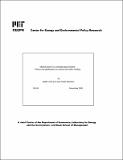| dc.contributor.author | Liski, Matti | en_US |
| dc.contributor.author | Montero, Juan-Pablo | en_US |
| dc.contributor.other | Massachusetts Institute of Technology. Center for Energy and Environmental Policy Research. | en_US |
| dc.date.accessioned | 2009-04-03T17:07:02Z | |
| dc.date.available | 2009-04-03T17:07:02Z | |
| dc.date.issued | 2005 | en_US |
| dc.identifier | 2005-016 | en_US |
| dc.identifier.uri | http://hdl.handle.net/1721.1/45046 | |
| dc.description.abstract | We consider a market for storable pollution permits in which a large agent and a fringe of small agents gradually consume a stock of permits until they reach a long-run emissions limit. The subgame-perfect equilibrium exhibits no market power unless the large agent's share of the initial stock of permits exceeds a critical level. We then apply our theoretical results to a global market for carbon dioxide emissions and the existing US market for sulfur dioxide emissions. We characterize competitive permit allocation profiles for the carbon market and find no evidence of market power in the sulfur market. | en_US |
| dc.format.extent | 36, [8] p | en_US |
| dc.publisher | MIT Center for Energy and Environmental Policy Research | en_US |
| dc.relation.ispartofseries | MIT-CEEPR (Series) ; 05-016WP. | en_US |
| dc.title | Market power in a storable-good market : theory and applications to carbon and sulfur trading | en_US |
| dc.type | Working Paper | en_US |
| dc.identifier.oclc | 68719714 | en_US |
